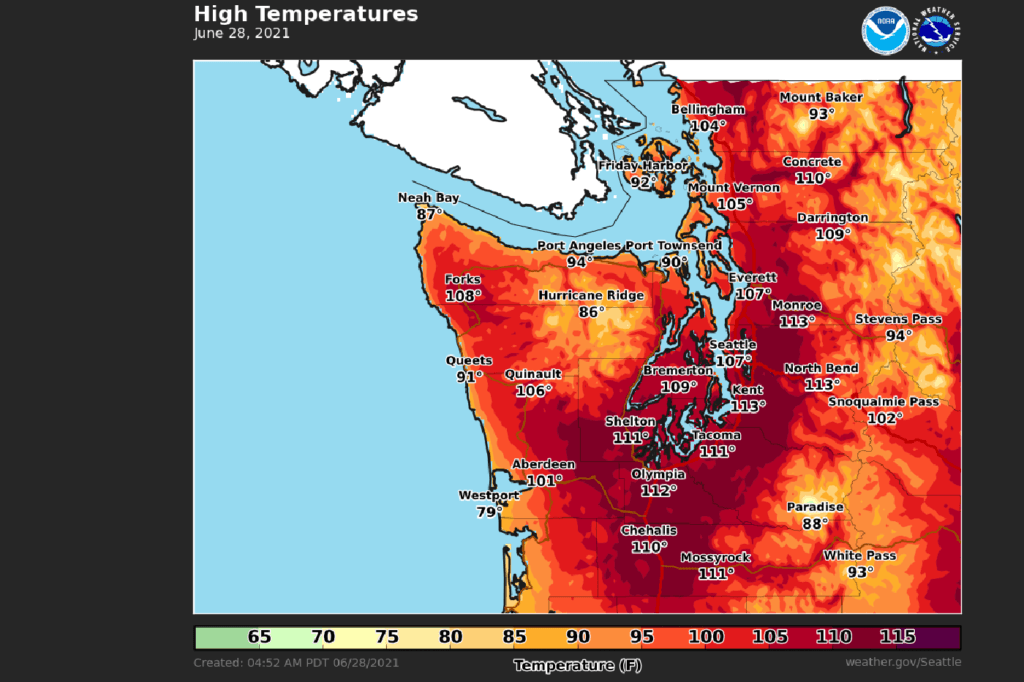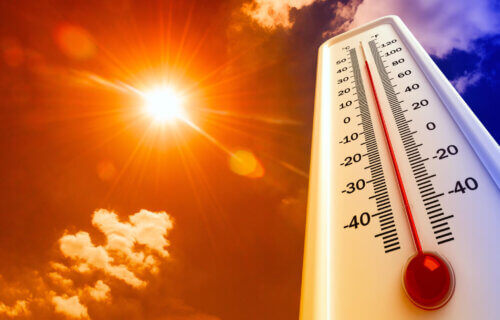LOS ANGELES — The Pacific Northwest heat wave of 2021 brought boiling temperatures of more than 120 degrees Fahrenheit. While many may see this as a sign of the times, are these extreme events really occurring more often due to climate change? A new study concludes that while we continue to see the very real and threatening effects of a warming planet, fortunately heat waves of this level are occurring no faster than climate change models already predicted.
A team from UCLA says climate change may be influencing how hot temperatures get each summer, but record-breaking events like the heat wave of 2021 are not so extreme that they can’t be predicted by climate change simulations. In fact, researchers say the Pacific Northwest heat wave is roughly a once-in-10,000-years type of event.
“It was outrageous how extreme and severe that heat wave was,” says Karen McKinnon, an assistant professor of atmospheric and oceanic sciences and a part of the UCLA Institute of the Environment and Sustainability, in a university release. “Climate models struggle to capture events this extreme, and most early research puts the chances of it occurring at zero.”
McKinnon and co-author Isla Simpson from the National Center for Atmospheric Research analyzed historical weather trends in Washington, Oregon, and British Columbia, as well as climate model simulations during their study. Their review found that climate models are able to simulate extreme heat waves just like the one in 2021 — revealing that they only happen once every several thousand years. Moreover, in the cities where temperatures peaked around 121 degrees, the models show this will only happen once every 100,000 years!

Won’t climate change speed this timetable up?
The review discovered that climate change is increasing the severity of heat waves and average summer temperatures at the same pace. However, there’s no guarantee this trend will continue in the future.
“We don’t see historical evidence of hot temperatures increasing faster than average temperatures during the early summertime when the heatwave occurred,” McKinnon says. “The 2021 Pacific Northwest heat wave appears to be the result of climate change and extraordinarily bad luck with natural variability.”
Using data on similar regions, including coastal Alaska, British Columbia, Canada, and Nordic countries, researchers looked to see if other regions in the world are becoming more susceptible to extreme climate events. All of these regions share similarities with the Pacific Northwest and are in the same northern latitude. In this area, heat waves form as a result of stagnant high-pressure systems.
In 50 climate model simulations examining weather from 1850 to 2100, which assume that greenhouse gases will double over the next century, results still show that the Pacific Northwest heat wave is something that will only occur once in 10,000 years.
“The good news is that we don’t find evidence that events this extreme should start happening regularly,” McKinnon explains. “The bad news is the summer of 2022 brought record-breaking heat waves everywhere from the United Kingdom to China to California. We need to continue evaluating whether these very extreme events are telling us something new about how the climate is changing, and whether they confirm or refute our latest findings.”
Could the models be wrong?
Although McKinnon doesn’t believe that extreme events are happening faster than average climate change models would predict, more historic heat waves will force scientists to reevaluate their conclusions.
“If 10,000-year events keep happening, that suggests there may be something missing in the climate model we used,” the researcher admits.
Despite the good news that historic climate events are not taking place more often, study authors warn that global warming is still a problem that’s not going away.
“If everything’s moving with mean climate change, that can sound like it’s not so bad,” McKinnon concludes, “but look at the severe impacts of the climate change we’re already experiencing.”
The findings are published in the journal Geophysical Research Letters.

Good grief. Ignore reality and proclaim the models are the correct metric. How utterly stupid.
All environmentalists are communists
This is simply false. There were similar heat waves recorded in the Pacific Northwest in July 1891, July 1942, and August 1981.
“The findings are published in the journal Geophysical Research Letters.”
These are behind paywalls. Ordinary citizens who are interested in reading more about this subject have to pay a penalty to learn more about this very important subject. If the work leading to the findings were paid for with federal grant funds then this stuff should be freely available to all.